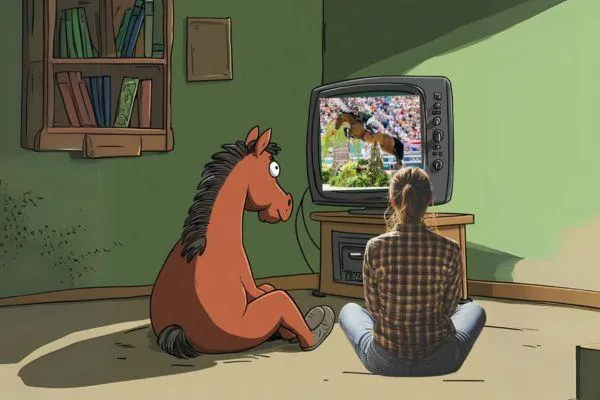Sport Hypnotherapy Blogs
Learn more about Hypnosis & Mindset Coaching and how they can be applied to your life!

The Psychology Behind Horse Competitions. Why We Compete and Watch
The Psychology Behind Horse Competitions. Why We Compete and Watch
Horses have been integral to human history for thousands of years, from their roles in ancient battlefields to their presence in modern sports arenas. While their uses have evolved significantly over time, one aspect has remained constant: our fascination with these magnificent creatures and the competitions they inspire. But why do humans feel compelled to compete with and watch horses, striving for excellence and often pushing boundaries? Let’s explore the psychology behind our enduring relationship with horses and the thrill of equestrian competitions.
Historical Roots of Horse Competitions
The history of horse competitions dates back to ancient times, when horses were first used in warfare. The ability to manoeuvre a horse swiftly and skilfully was crucial for survival and victory on the battlefield. This need for agility and control laid the foundation for early equestrian contests (BioMed Central) (Psychology Today).
Chariot Racing and Mounted Games: Ancient Greeks and Romans held chariot races and mounted games as forms of entertainment and demonstrations of martial prowess. These events were not just about speed and skill but also served as a testament to the rider's status and bravery (Horse Journals) (Psychology Today).
Medieval Tournaments: In medieval Europe, tournaments and jousting became popular among knights, serving as both military training and social gatherings. These events were prestigious occasions, emphasizing chivalry, honour, and the skilful partnership between horse and rider (Psychology Today) (BioMed Central).
Modern Equestrian Sports: As technology advanced and warfare evolved, the role of horses shifted away from combat. However, their importance in sports grew. Equestrian competitions were formalized, leading to the establishment of disciplines like dressage, show jumping, and eventing, which continue to attract participants worldwide (Horse Journals) (Psychology Today).
Psychological Motivations for Competing
Understanding the psychology behind why we compete in horse events involves examining several key factors:
Competitive Instinct: Humans have a natural desire to compete, driven by evolutionary instincts to survive and thrive. Competing allows individuals to test their skills and abilities, pushing themselves and their horses to new heights (BioMed Central) (Psychology Today).
Social Status and Prestige: Historically, owning and competing with horses has been a symbol of wealth and power. Even today, equestrian sports are often associated with luxury and exclusivity, attracting individuals seeking social status and recognition (Horse Journals) (Psychology Today).
The Human-Animal Bond: The deep connection between humans and horses is a significant motivator for competition. This bond is built on trust, communication, and mutual respect, providing emotional fulfillment and satisfaction. Riders often view their horses as partners, working together to achieve success (BioMed Central) (Psychology Today).
Thrill and Excitement: The adrenaline rush associated with high-stakes events is a powerful psychological driver. The unpredictability and challenge of equestrian sports contribute to their appeal, providing a sense of thrill and excitement that many competitors crave (Horse Journals) (Psychology Today).
The Beauty and Power of Horses: A Spectator's Delight
Humans have always been captivated by the beauty and power of horses. These majestic animals embody grace, strength, and speed, making them a source of inspiration and admiration throughout history. Watching horses compete or perform is not just about witnessing athletic feats; it's about connecting with the raw, untamed spirit that horses represent.
The Psychology of Spectating
Awe and Wonder: Horses, with their powerful muscles and elegant movements, evoke a sense of awe and wonder in spectators. Their ability to combine grace with strength appeals to our appreciation for beauty and athleticism, creating an emotional and visual experience that resonates deeply with us (Psychology Today) (BioMed Central).
Emotional Connection: Observing the bond between horse and rider taps into our emotions, reflecting the ideal of partnership and trust. This connection mirrors our own relationships and aspirations, making equestrian events relatable and emotionally engaging (Horse Journals) (Psychology Today).
Cultural Symbolism: Horses have been symbols of freedom, nobility, and power across cultures for centuries. Watching them perform reinforces these archetypes, allowing spectators to engage with these timeless symbols in a contemporary setting (Psychology Today) (Horse Journals).
Escape and Fantasy: For many, horse competitions offer a temporary escape from daily life, transporting spectators to a world of elegance and competition. This sense of fantasy and adventure is psychologically rewarding, offering a break from routine and a chance to dream (Psychology Today) (BioMed Central).
Biophilia Hypothesis: This theory suggests that humans have an innate affinity for nature and living things. Horses, as powerful representatives of the natural world, fulfill this psychological need, providing satisfaction and happiness simply by their presence (BioMed Central).
The Dark Side: Ethics and Rule-Bending
While the desire to win is a natural aspect of competition, it can sometimes lead to unethical behaviour. The intense pressure to succeed may push competitors to bend rules or engage in practices that are barely within legal and ethical boundaries (Horse Journals) (Psychology Today). This behaviour reflects the competitive nature of humans and the psychological pressure to achieve success at any cost.
The Role of Psychology in Performance
The psychology of equestrian competition extends beyond motivation and ethics. Understanding how mood, emotion, and temperament impact both horse and rider is crucial for success (BioMed Central) (Horse Journals).
Mood and Emotional Reactions: A horse's mood and emotional response to its environment significantly impact performance. Stressors like noise, unfamiliar surroundings, or a rider's anxiety can influence a horse's behaviour. Understanding and managing these factors is vital for competitive success (BioMed Central) (Horse Journals).
Human Influence: The rider's emotional state can also affect the horse. A skilled rider can positively influence a horse's mood and emotional reaction, coaxing it through stressful experiences. However, research suggests that while experienced riders may manage their stress, less experienced individuals might inadvertently pass on their anxiety to their horses (BioMed Central) (Horse Journals).
Conclusion
The psychology behind horse competitions is a complex interplay of historical, social, and emotional factors. From ancient battlefields to modern arenas, our relationship with horses has evolved, driven by a desire for competition, mastery, and the unique bond between human and horse. As spectators, we are not just witnessing a sport; we are part of an experience that celebrates the enduring bond between humans and these incredible animals.
This exploration highlights the deep-rooted psychological motivations that drive human behaviour in the world of equestrian sports, celebrating the enduring bond between humans and horses while acknowledging the challenges and responsibilities that come with competition. This fascination with horses reflects a complex interplay of emotions, cultural significance, and a universal appreciation for the natural world.
Get in touch with us
Before you enquire, please have a good look through our site. We do our best to answer all questions upfront.
For new clients, be sure to watch our Getting Started Presentation which goes over the details of how our clinic runs.
For existing clients, click the Existing Client button to rebook another appointment.
For all other enquiries use the form below and we will get back to you as soon as possible.
0483 955 389
PO Box 56, Tyabb VIC 3913
Mon - Fri 10.00-4.00
Learn More

Disclaimer: Hypnotherapy and coaching services offered on this site are intended for general wellbeing and personal development. They are not a substitute for medical or psychological diagnosis or treatment. Results may vary from person to person.
Follow Us
Follow Us
© Copyright 2025. SPORT HYPNOTHERAPY, All rights reserved.

